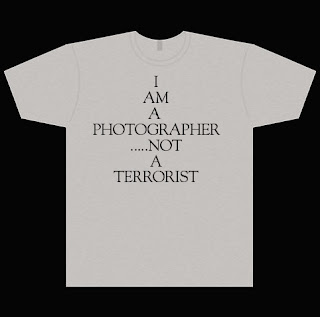
Amateurs and professionals alike have been blogging over the last year that police have stopped and questioned them regarding their intentions and even asked photographers to delete images from their camera that they deemed are unacceptable.
I have been stopped a few times while working for The Northern Echo. One case was while photographing the infamous ghost ships at Hartlepool. As the location is next door to a nuclear power station I was perfectly happy with this and the police took all my details and confirmed with my office that my ID was valid. The flip side is when I was stopped outside of Teesside magistrate’s court while doing a ‘court snatch’. Press Photographers often have to do this and it’s just a case of photographing someone as they leave the court. After I’d got my pictures the police stopped me and undertook a ‘stop and account’. After showing my ID I was let on my way but not without being made to feel like I was behaving in an unacceptable way.
The police obviously have to use their judgement when assessing whether us photographers are legitimate innocent members of the public or a terrorists on a reconnaissance mission but surly some common sense could be used. If you were photographing a court for some nefarious reason would you be using a large camera and (in this case) flash?
Below are cases that the Independent have stated that are good examples of this:
November, BBC photographer Jeff Overs stopped and searched while he takes sunset photographs of St Pauls Cathedral.
November, Andrew White, 33, is stopped after taking photographs of Christmas lights on his way to work in Brighton. He is asked to give his name and address.
August, Police order trainspotter Stephen White to delete images of train carriages taken during a holiday in Wales. CCTV near an oil refinery monitored him taking the pictures and alerted local police. Mr White refused.
July, Alex Turner, an amateur photographer, arrested under anti-terrorism laws for taking pictures of two officers as they question him for photographing a fish and chip shop in Kent. Later released without charge.
April, Two Austrian tourists told to delete pictures of Walthamstow bus station. Unaware that police have no right to enforce deletion of images without a warrant, they comply.
Further reading from the Indy
http://www.independent.co.uk/news/uk/home-news/photographers-snap-over-use-of-section-44-by-police-officers-1833839.html
Surly with Google’s street view, the internet and the fact that we have eyes means that the views of say local landmarks are certainly already in the public domain. Unnecessarily targeting photographers just makes members of the public wary of the police.
If you were to assert your rights and refuse to give your name and details the police may be reasonable and respect your privacy or they may arrest you under the terrorist act or under public order legislation. People have been arrested for this so do you feel brave enough to take a stand?
I’ve heard of many cases of press photographers being asked to delete photographs by the police despite them having no jurisdiction to do so. I have been asked not to photograph one incident because the police weren’t wearing the regulation safety equipment.
This is by no means a new to press photographers. Here is an extract from Hold The Front Page from 2006.
“A photographer from the MK News was handcuffed and arrested after trying to take a picture of a road traffic accident.
Andy Handley, staff photographer at the Milton Keynes-based weekly, was then taken to a police station, photographed, fingerprinted, DNA tested and held in Central Milton Keynes Police cells before being interviewed.
Despite Andy, a photographer with 30 years experience, standing behind a police cordon to take his pictures, he was confronted by road traffic police sergeant Fraser Chamberlain after attending the scene of a crash just before 5.30pm on Tuesday, September 12.
When Andy said he was perfectly within his rights to take a picture, Sgt Chamberlain said he would be arrested at the scene unless he handed over his camera equipment.
Andy refused and was handcuffed and arrested.
He was later released at 1.15am after being cautioned for obstruction.
Read full article here http://www.holdthefrontpage.co.uk/photo/2006/09sep/060921mk.shtml
Knowing your rights can only be a good thing in the current climate and (according to The Independent) these are the most important points.
* If police stop and search you, the first thing you should ask is on what grounds they are conducting the search and under what powers.
* Police are able to conduct searches under a number of different pieces of legislation but they usually use either the Public Order Act, the Criminal Justice Act or under Section 44 of the Terrorism Act 2000.
* Unless you are stopped while driving a car, you do NOT have to give your name or address.
* Police officers are obliged to ask for your given ethnicity. Once again, it is up to you whether you choose to answer or not.
* If police use Section 44 of the Terrorism Act they are entitled to view any images you have taken but they are NOT allowed to delete them. They can only do so with a court order.
* Under Section 58a of the Terrorism Act, police are only allowed to stop a photographer taking pictures of officers if they reasonably suspect the photos are intended to be used in connection with terrorism.
* Whether you are stopped and searched, or merely stopped and accounted for, the police officer should hand you a record of your stop.
Best of Luck!
0 komentar:
Posting Komentar